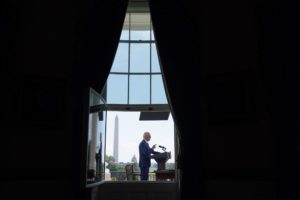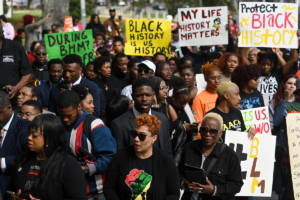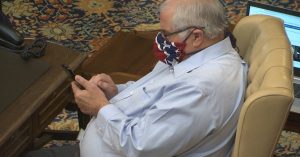SCOTT SIMON, HOST:
The national registry says Native Americans make up less than 1% of the U.S. population but account for nearly 4% of all missing persons reports. Federal commission investigating the issue is now concluding hearings it’s been holding around the country. Jeanette DeDios from member station KUNM in Albuquerque reports on some of the solutions Indigenous people have suggested.
JEANETTE DEDIOS, BYLINE: Tiffany Reid is one of nearly 200 Native people known to be missing in New Mexico and the Navajo Nation. Her big sister, Deiandra, remembers her always adopting stray cats and writing poetry.
DEIANDRA REID: She did a poetry slam contest in, I want to say, Missouri – the last place that she went just right before she went missing.
DEDIOS: One day in 2004, when she was 16, she left to go to school in Shiprock.
REID: That was it. We never seen or heard from her since then.
DEDIOS: Reid is one of dozens of people who testified at the Not Invisible commission hearing in Albuquerque, raising long-standing complaints about police response.
REID: It’s really hard for me to get in contact with anybody, and when I do, they’re constantly changing officers. So I’ve talked to maybe three different officers so far within the last two years. It’s really frustrating to me.
DEDIOS: Policing in Indian country is often a confusing jumble of state, local, tribal and federal agencies. Again and again at the hearings, people complain those agencies rarely coordinate well in missing persons cases. Amber Crotty, a delegate on the Navajo Nation Council, says families organize their own searches, investigations and protest marches.
AMBER CROTTY: The families are tired of walking. They’re tired of protesting. They’re tired of just everything. They just want justice.
DEDIOS: Patricia Lightfoot, whose sister disappeared decades ago, testified police often seem ill-prepared to deal with Native communities.
PATRICIA LIGHTFOOT: What kind of education is being done and conducted, particularly with non-Native officers and our own tribal officers as well? What do you know about the history of our people? What do you know about historical and cultural oppression?
DEDIOS: These hearings are the result of a yearslong quest by America’s first Indigenous cabinet member, Interior Secretary Deb Haaland. Before she was appointed, she represented New Mexico in Congress and got the Not Invisible Act passed.
(SOUNDBITE OF ARCHIVED RECORDING)
DEB HAALAND: A real solution will never be found without the voices of Indigenous survivors, which is what is so special about this bill.
DEDIOS: The act requires the U.S. Department of Justice to partner with Interior to coordinate federal law enforcement response to missing Native persons. At the Albuquerque event, U.S. Attorney Alexander Uballez announced some new help.
ALEXANDER UBALLEZ: A new nationwide program to support the effort to locate missing and murdered Indigenous people, to seek proactive strategies to prevent future murders.
DEDIOS: Justice is assigning 39 assistant U.S. attorneys to offices in nine states to provide specialized support for missing and murdered Native cases. Justice has also promised to address crimes it says underlie missing persons reports like domestic and sexual violence and trafficking humans and drugs. Celina Montoya Garcia, from the Coalition to Stop Violence Against Native Women, traces some problems to decades of the federal government displacing Native people from their homelands and forcing kids into abusive boarding schools.
CELINA MONTOYA-GARCIA: Like, the trickling effects of all of that has also come down to our people, who have learned violence.
DEDIOS: Other violence comes from outside, like camps where largely male workers live while working coal mines or oil wells on Native lands.
MONTOYA-GARCIA: These camps are causing an increased rate in sex trafficking, sexual assault, domestic violence, the – like, there’s more, like, drugs, substance use happening.
DEDIOS: The commission will meet in Billings, Mont., this month and then for a virtual session later in the summer. In the fall, it is due to make recommendations aiming to stop disappearances like Tiffany Reid’s.
REID: I don’t think I’ll ever give up until I do find her or find out what happened to her. I just want to bring her home one way or another, you know, good or bad.
DEDIOS: For NPR News, I’m Jeanette DeDios in Albuquerque. Transcript provided by NPR, Copyright NPR.
NPR transcripts are created on a rush deadline by an NPR contractor. This text may not be in its final form and may be updated or revised in the future. Accuracy and availability may vary. The authoritative record of NPR’s programming is the audio record.




